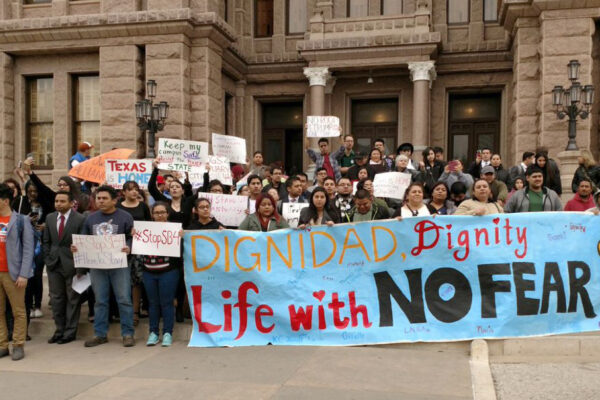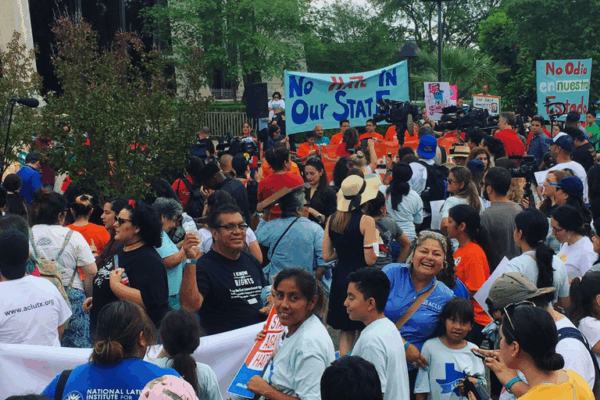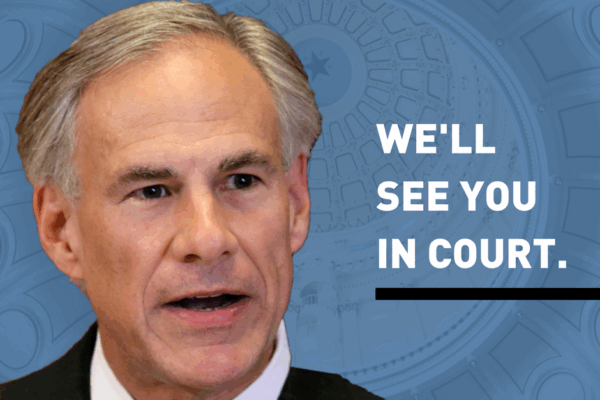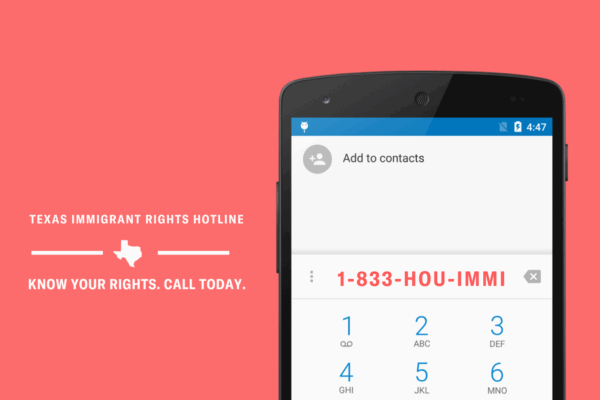This content is intended to serve as general information; it is not legal advice nor intended as legal advice.
Click here for Know Your Rights information about SB4 passed in the 4th Special Session of 2023.
Update (11/15/23): In 2017, the state of Texas passed SB4 and prevented local government and police chiefs from instructing individual officers or deputies to focus on high priority crime, and not harass community members about their immigration status. This law — combined with SB4 from the 4th Special Session of 2023 — will now make it even more difficult for local government and local heads of law enforcement to ensure individual officers are not engaging in racial profiling and unlawful discrimination.
Update (3/13/18): A federal appeals court upheld portions of Texas’ anti-immigrant SB4 law. The American Civil Liberties Union is challenging the law.
What is SB4?
SB4 is a Texas law that forces local governments and law enforcement agencies to cooperate with federal immigration officers. It punishes local officials who choose to prioritize their communities’ safety over the anti-immigrant agenda of politicians, diverts precious local resources away from communities to serve the needs of the federal government, corrodes public trust in law enforcement, and drives victims and witnesses of crime into the shadows, making everyone less safe. Sheriffs and police chiefs across the state strongly advised the legislature not to pass this awful law. Governor Abbott signed SB4 on May 7, 2017.
What is the status of SB4?
Cities and counties across the state challenged SB4 in federal court arguing that it was unconstitutional. On August 30, the court issued an order temporarily blocking the majority of SB4 from going into effect. The State of Texas immediately appealed the district court's preliminary injunction order to the 5th Circuit Court of Appeals and moved for an emergency stay of the order. After a hearing on September 22, 2017, in New Orleans, the 5th Circuit Court unblocked only the detainer mandate, leaving largely in place the injunction. On November 7, 2017, the Court of Appeals held a hearing on the full merits. On March 13, 2018, the Court of Appeals issued a ruling that unblocked most of the law, effectively allowing SB4 to go into effect.
What has been changed?
- Local officials can still make their own decisions about whether or when to assist in federal immigration enforcement, and will not face penalties for declining requests to assist with federal immigration agents.
- Local officials are now free to speak out against laws like SB4 that would require cooperation with federal immigration enforcement. For example, sheriffs and police chiefs can continue to speak publicly about why asking about immigration status is a poor police practice that harms public safety.
What was NOT blocked?
- Local officers can still ask about immigration status, if they choose to, but only during a lawful stop or arrest. But local officers cannot stop someone solely to ask about immigration status.
- Local officers are not required to ask about immigration status—they can choose not to ask. Local officers will not face any penalties if they chose not to ask about immigration status.
- If local officers decide to ask about immigration status, they cannot hold a person longer solely to inquire about their status or attempt to verify their status with Immigration and Customs Enforcement (ICE).
- If a local officer learns that someone is undocumented, he or she cannot arrest or continue to hold the person on that basis. The officer can provide that information to ICE, but is not required to do so and can choose not to.
If questioned about your immigration status by local or state police:
- You do not have to answer any questions about your immigration status, including where you were born, how you entered the U.S., if you are a citizen, or if you have lawful status or "papers."
- You have the right to remain silent. Simply say clearly that you wish to remain silent and that you do not wish to answer any questions about your status.
- If you are stopped in your car:
- Neither the driver nor passengers need to answer questions about anyone's immigration status.
- If you are the driver of the vehicle, you should provide your driver's license, proof of insurance and registration to the requesting officer, if you have them. Do not provide false documents.
- If you are a passenger, you can ask if you are free to leave. If yes, silentely leave.
- You do not need to provide foreign identification.
- If you are under arrest:
- You must give your name, residence address, and date of birth only.
- You do not have to answer any other questions. Say clearly that you wish to remain silent.
- Do not say anything else, sign anything, or make any decisions without a lawyer.
Have you been affected by SB4?
Call the Immigrant Rights Hotline. If you or your family have been detained, arrested, or questioned about your immigration status because of SB4, please contact the ACLU of Texas at 1-833-HOU-IMMI (1-833-468-4664), 9 a.m.-5 p.m., Mon. - Fri.
Stay Informed
Sign up to be the first to hear about how to take action.
By completing this form, I agree to receive occasional emails per the terms of the ACLU’s privacy statement.
By completing this form, I agree to receive occasional emails per the terms of the ACLU’s privacy statement.




